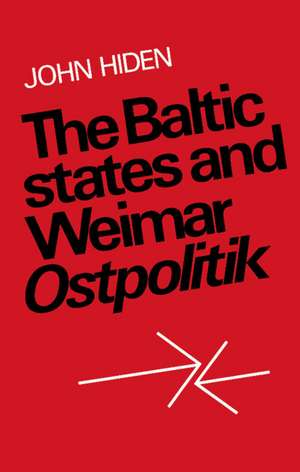The Baltic States and Weimar Ostpolitik
Autor John Hidenen Limba Engleză Paperback – mai 2002
Preț: 286.51 lei
Nou
Puncte Express: 430
Preț estimativ în valută:
54.83€ • 58.63$ • 45.71£
54.83€ • 58.63$ • 45.71£
Carte tipărită la comandă
Livrare economică 17 aprilie-01 mai
Preluare comenzi: 021 569.72.76
Specificații
ISBN-13: 9780521893251
ISBN-10: 0521893259
Pagini: 292
Dimensiuni: 140 x 215 x 17 mm
Greutate: 0.42 kg
Ediția:Revised
Editura: Cambridge University Press
Colecția Cambridge University Press
Locul publicării:Cambridge, United Kingdom
ISBN-10: 0521893259
Pagini: 292
Dimensiuni: 140 x 215 x 17 mm
Greutate: 0.42 kg
Ediția:Revised
Editura: Cambridge University Press
Colecția Cambridge University Press
Locul publicării:Cambridge, United Kingdom
Cuprins
Introduction; Part I. The Politics of Peacemaking 1919–20: 1. German–Russian perspectives; 2. The Baltic German as Auslandsdeutsche; Part II. Trade and Foreign Policy 1920–3: 3. The springboard concept; 4. The politics of provisional trade treaties; Part III. Weimar Revisionism and Baltic Security 1923–33: 5. Randstaatenpolitik; 6. The politics of arbitration: Locarno and the Baltic; Conclusions; 7. Trade, minorities and Ostpolitik; Map; Tables; Abbreviations; Notes; Bibliography; Index.
Recenzii
'This thoughtful, provocative study of Weimar Germany's relations with Estonia, Latvia and Lithuania is an example of revisionist scholarship at its best. It does not simply challenge commonly held views but widens the scope of historical enquiry by introducing fresh evidence to support a reassessment of Weimar foreign policy'. Revue Canadienne des Slavistes
'This long awaited book will appeal to all Baltic specialists. Here, at last, is a comprehensive study of an important chapter in the European politics of the 1920s'. Slavonic and East European Review
'The book concerns the strategy and goals of Weimar foreign policy in an area which is eminently suitable for discussing the continuity of annexationist ambitions and at the same time the relations between Germany and the Soviet Union.' Sozial und Wirtschaftsgeschichte
'John Hiden's admirably clear and lucid account of Weimar Germany's relationships with the Baltic states is the first of its kind … His book is highly recommended'. The Times Higher Education Supplement
'The author writes from a broad perspective, basing his work on available German, British, French, Russian and Baltic sources and meticulously footnoting everything he states. A model study.' Choice
'A significant contribution from a scholar with an imposing grasp of the complex international history of the interwar period.' Nyt Fra Historien
'The book is one which no scholar of the subject, or more widely, of the debate about continuities in German policy or of the antecedents of Rapallo, will be able to overlook.' International Relations
'Anybody wishing to inform himself fully about German policy towards the Baltic states from the end of the First World War until the outbreak of the World economic crisis, whilst focusing on the essential developments, at last has just the book to hand, with John Hiden's thoughful, careful study, based on prolonged research and detailed knowledge of the sources.' Historische Zeitschrift
'Dr Hiden's pioneer study of relations between Weimar Germany and the Baltic states based on much little-used material in German and British archives throws new light on a neglected and misunderstood area.' History
'The strength of the work lies in its skilful interweaving of political and economic issues with the fate of the German minority and the strong native nationalism which emerged in the Baltic states after the German occupation and exploitation of the war years and their aftermath. The book rightly treats the Weimar period as sui generis, and not as an aftermath of Wilhelmine Germany or as a prelude to Hitler, as so many other historians have done.' Cambridge Historical Journal
'A study, which with its clear and at the same time carefully balanced argument, attracts the reader and leaves hardly any openings for the critic.' Jahrbücher für die Geschichte Osteuropas
'This long awaited book will appeal to all Baltic specialists. Here, at last, is a comprehensive study of an important chapter in the European politics of the 1920s'. Slavonic and East European Review
'The book concerns the strategy and goals of Weimar foreign policy in an area which is eminently suitable for discussing the continuity of annexationist ambitions and at the same time the relations between Germany and the Soviet Union.' Sozial und Wirtschaftsgeschichte
'John Hiden's admirably clear and lucid account of Weimar Germany's relationships with the Baltic states is the first of its kind … His book is highly recommended'. The Times Higher Education Supplement
'The author writes from a broad perspective, basing his work on available German, British, French, Russian and Baltic sources and meticulously footnoting everything he states. A model study.' Choice
'A significant contribution from a scholar with an imposing grasp of the complex international history of the interwar period.' Nyt Fra Historien
'The book is one which no scholar of the subject, or more widely, of the debate about continuities in German policy or of the antecedents of Rapallo, will be able to overlook.' International Relations
'Anybody wishing to inform himself fully about German policy towards the Baltic states from the end of the First World War until the outbreak of the World economic crisis, whilst focusing on the essential developments, at last has just the book to hand, with John Hiden's thoughful, careful study, based on prolonged research and detailed knowledge of the sources.' Historische Zeitschrift
'Dr Hiden's pioneer study of relations between Weimar Germany and the Baltic states based on much little-used material in German and British archives throws new light on a neglected and misunderstood area.' History
'The strength of the work lies in its skilful interweaving of political and economic issues with the fate of the German minority and the strong native nationalism which emerged in the Baltic states after the German occupation and exploitation of the war years and their aftermath. The book rightly treats the Weimar period as sui generis, and not as an aftermath of Wilhelmine Germany or as a prelude to Hitler, as so many other historians have done.' Cambridge Historical Journal
'A study, which with its clear and at the same time carefully balanced argument, attracts the reader and leaves hardly any openings for the critic.' Jahrbücher für die Geschichte Osteuropas
Descriere
A study of German economic influence in the Baltic states after World War I.















